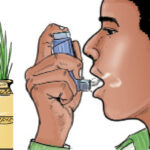Dr Na’ima is a household name on social media platforms in Nigeria and beyond. She is famous for her rare passion for offering medical therapy and tackling issues that relate to the welfare of the girl child, among others. She has over a million followers across four platforms – Facebook, Instagram, TikTok and YouTube. In this interview with Daily Trust Saturday, Dr Na’ima Idris speaks on why she ventured into advocacy despite being a trained medical doctor.
Why did you venture into this line of advocacy and how has it been so far?
I’m a medical professional and reproductive health advocate. My initiative includes a variety of outreach programmes and campaigns aimed at educating and empowering girls in my society.
I am also working to establish a long-term and sustainable system for educating young girls and women about reproductive health and personal hygiene in the northern part of Nigeria. I have facilitated campaigns in collaboration with community leaders to educate and offer medical care to the girl-child across schools and communities through my foundation, She-Win Foundation.
As a trained medical doctor, you could venture into various profitable areas of business, but you opted for non-profit. What do you hope to achieve with She-Win foundation and how is it related to Girls Talk Series?
- Outgoing govs bequeath multi-billion naira liabilities to successors
- I’m ready to quit acting for marriage – Aisha Jogana
The overall goal and purpose of medical practice is helping people gain access to medical care and information. Working as a non-profit further strengthens our direction and aims to tackle developmental issues in the areas of health, education and gender inclusion among women and children in vulnerable and hard-to-reach communities.
GirlsTalk Series is an online educational platform that caters to girls, women and sometimes men’s health, and works in unison with the She-Win foundation to reach and educate as many people as possible.
You chose a controversial subject in a conservative terrain and the backlash is obvious – name-callings, blackmail and stereotyping, among others. How do you deal with the insults and what keeps you going?
The subject of reproductive health has been a controversial one across cultural divides, especially in the northern part of Nigeria.
The need to be explicitly clear about the human body and anatomy for the purpose of education still comes off a bit unsettling for some of the target audience.
I don’t see the reactions as insults or name calling, but essential building blocks towards understanding my target audience better and shaping my message in a digestible and effective way.
Are there any peculiar challenges you face in your line of business?
As with any endeavour or career path, I do have challenges. Firstly, navigating the communication approach with a highly conservative audience and also getting the desired support and collaboration in terms of resources and access.
What are some of the glorious moments you’ve encountered?
One of my major glorious moments so far is the Nelson Mandela Fellowship. It led to multiple career milestones, exposure to wealth of knowledge and information and a robust network of influential and important people.
You are a 2022 Mandela Washington Fellow, how has your work impacted your acceptance into this prestigious fellowship and what did you learn in the United States that you want to implement at home for enhanced community impact?
I applied for the fellowship on the basis of my work and aspirations towards improving health education, literacy and providing training on leadership development among women and girls.
The relevance of my work to nation building definitely impacted my eligibility and acceptance.
I learned a lot ranging from leadership skills and approach, methods of engaging stakeholders, networking approach, and improved medical practice and equipment. I’ve integrated all of these into my project and campaign implementation here at home.
Let’s look back at the year 2020 – the COVID-19 pandemic, how did it affect your work? Did you receive any government support or incentive as a way of encouraging you to do more? How did you generally raise funds to sustain your dreams for community impact?
Before the COVID-19, I was already leading the initiative to raise health awareness in schools and making sanitizers and disinfectants available to the general public under the movement of ‘Mu san lafiyar mu’.
When the COVID-19 pandemic struck, it didn’t impact the goal or direction differently, it rather proved the need for expansion and exposure to as many people as possible.
No, I didn’t receive any incentive from the government.
What puts smiles on your face on a typical day and what is the most fulfilling part of being a humanitarian?
Hitting a career milestone. Be it recognition or financial wise. The most fulfilling part about being a humanitarian is actualizing your ideas and seeing the positive impact it makes on people.
How would you describe your journey so far? What are the things you do differently that stand you out from the crowd?
The journey has been rewarding, fulfilling, educative and enlightening. And I look forward to learning and gaining more value from it.
Treating reproductive health issues and girl child welfare in the Northern part of Nigeria already sets me apart from others. Delicate as it is, I have carved a unique and acceptable system of driving my message down to the depth of my target audience.
Do you think the existence of Non-governmental Organizations has to a large extent covered up for some of the loopholes in governance?
Yes, it has. It is public knowledge that the government can’t do it all and they need all the help they can get. There are tons of local NGOs treating deep grassroots level issues outside the government’s immediate interests. Non-governmental Organizations are essential to nation building governance in general.

 Join Daily Trust WhatsApp Community For Quick Access To News and Happenings Around You.
Join Daily Trust WhatsApp Community For Quick Access To News and Happenings Around You.

